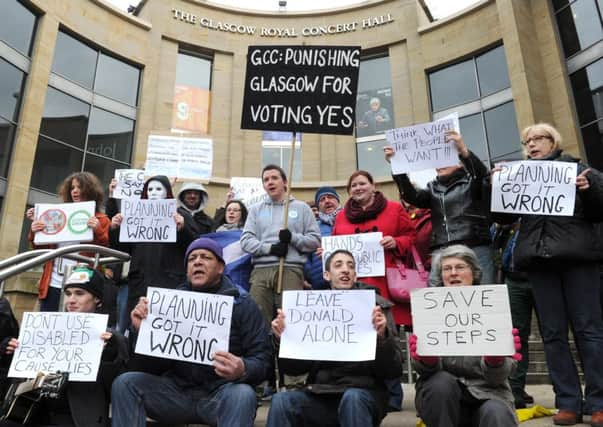Martyn McLaughlin: City out of step with Glasgow


The cascade of steps at the summit of Glasgow’s Buchanan Street is the stage for Scotland’s greatest theatre. They are the habitat of buskers and shirkers, bankers and workers, a place to take pause from the urban bustle over a wild crayfish and rocket bloomer or a sausage supper, a realm in which predatory Glasgow bams in search of an audience for their improbable tales of woe know they will find easy prey and 20 pence for that fabled bus to East Kilbride.
Last week, Glasgow City Council’s planning committee approved the demolition of the steps, which hug the southern entrance to the Royal Concert Hall. A quarter century after their installation – part of a sweeping metamorphosis of Glasgow’s urban environment in its year as European City of Culture – they are to be replaced by a tubular glass atrium that is half neomodern budgie cage, half translucent pedal pin; a gateway to a £390 million vision that will expand the floorspace of the Buchanan Galleries shopping centre by 392,000 square metres.
Advertisement
Hide AdAdvertisement
Hide AdThe decision was greenlit in spite of the protestations of senior politicians and a petition to which more than 14,000 people put their name, pointing out that the steps are one of the few remaining places in the city centre when people can sit freely. Planning mandarins reasoned that from a townscape perspective, the steps are of “little value.” In the proscriptive, anal lexicon of their trade, that may be true, but the report also dismissed them as an “access route.” Its author would presumably categorise the Grand Canyon as a gap site or Machu Picchu as a hillock.
What falls outside the remit of material planning considerations is the standing of the steps in the eyes of ordinary Glaswegians. Judged on architectural merit alone, the steps are of no great consequence, but the true value of a public realm feature is not its physical fabric, but the purpose it serves.
Those who have followed Gordon Matheson’s administration will not be surprised at this dissonance between the song it sings and the chorus of the people. From the ignominious folly of the shelved George Square revamp to the aborted proposal that would have raised Carlo Marochetti’s equestrian statue of the Duke of Wellington beyond the reach of mischievous undergraduates, the authority’s disregard for how people interact with their city has blighted commendable initiatives such as its stance on the living wage.
The demise of the steps is borne of the council’s primary impulse: commercial space. You need only glance at the Glasgow Retail Prospectus, a glossy pamphlet produced by Invest Glasgow, the local authority’s inward investment team, to appreciate how the civic fathers believe shopping is the foundation of the city economy. Glasgow, it vaunts, is “the UK’s largest and most successful shopping location outside of London” boasting “prime and super prime shopping.”
Anyone who has strolled Buchanan Street’s tributary avenues of Sauchiehall Street and Argyle Street of late – the so-called Golden Z – might disagree. Discount stores, bookies and payday loan hustlers pepper characterless streetscapes where increasing numbers of long-established independent traders roll down the shutters for good. Indeed, amid the outcry over the fate of the steps, there has been a troubling lack of scrutiny of the enlargement plans for Buchanan Galleries, especially given £80m of public money has been ploughed into the scheme via a financial instrument known as Tax Incremental Financing (TIF), which allows councils to fund infrastructure projects by borrowing against future additional business rate income generated by the development; in short, the retailers must succeed.
Although new shops will whet consumers’ appetites, research by Invest Glasgow suggests the owners of Buchanan Galleries – Land Securities, a London-headquartered commercial property firm – are swimming against the tide, with units lying vacant and footfall waning. There were 1,043,481 visitors in June 2014, compared to 1,226,897 twelve months previously and 1,272,159 in June 2012. The business strategy is also questionable in light of the redevelopment plans of competing emporiums like Braehead and Silverburn also have redevelopmment plans.
The evolution of those shopping centres will colonise unheralded out of town land, the plans for Buchanan Galleries impact directly on the anatomy of Glasgow’s heart, continuing the pervasive trend that repackages the privatisation of public space in the guise of regeneration.
A few years ago, Michael Kimmelman, the architecture critic of the New York Times, lamented public spaces which are “not really public at all”. They are, he raged, “quasi-public, controlled by their landlords”. What faith can we place in the landlords of Buchanan Galleries when it comes to safeguarding the top of the street as a place to congregate, protest and idle? With FTSE 100 status and recent pre-tax profits of £1.1 billion, Land Securities has the capital to rip up the atrium blueprints and create a truly communal alternative, but does it have the will?
Advertisement
Hide AdAdvertisement
Hide AdTwo years ago, it lost a court battle with HMRC over a £60m tax bill. The firm had sold shares in one of its group companies to a Cayman Island subsidiary of Morgan Stanley, which inflated the value of the shares by pumping money into the subsidiary. Land Securities bought back the shares at the higher price, claiming they made a loss of £200m that could be used as a deduction against tax. The tribunal disallowed the loss and HMRC described the scheme as “flagrant tax avoidance”.
Who then, will stand up as Buchanan Street’s guardians? Only the councillors of Glasgow, once they realise their role is not that of catalysts, facilitators or brokers for commercial interests, but servants of the people. People Make Glasgow, we told the world during last summer’s Commonwealth Games. It is a mantra with more truth than most, but as scaffolding rises over sites we hold sacred, it rings increasingly hollow.
FOLLOW US
SCOTSMAN TABLET AND MOBILE APPS